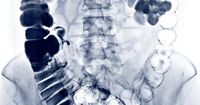In an alarming trend, the incidence of colon cancer among individuals under the age of 50 is rising sharply in the Netherlands. Recent research conducted by the Integraal Kankercentrum Nederland (IKNL), the Nederlands Kanker Instituut (NKI), Amsterdam UMC, and the Catharina Ziekenhuis in Eindhoven has revealed that the number of diagnosed cases has increased significantly over the past 25 years, with projections indicating this trend will continue into the next decade.
According to the latest statistics, in 2023, 654 people aged between 15 and 49 were diagnosed with colon cancer, translating to 9.5 cases per 100,000 individuals. This marks a notable increase from 6.3 cases per 100,000 in 1998, representing an overall rise of approximately 50 percent over the last quarter-century. Researchers anticipate that by 2035, this number could grow to approximately 762 cases, a further increase of 16 percent.
Paulien, a 39-year-old diagnosed with colon cancer after years of experiencing symptoms, emphasizes the urgency of early detection. "Colon cancer is no longer just an old person's disease," she stated, highlighting the need for heightened awareness among both patients and healthcare professionals.
Despite the rising numbers, colon cancer remains relatively rare compared to other cancer types. However, the researchers are concerned about the unclear reasons behind this increase. They suggest that lifestyle factors, such as obesity, lack of physical activity, and dietary choices, may contribute significantly to the rising incidence of colon cancer among younger populations. The role of genetic predisposition appears to be minimal, affecting only a small percentage of patients.
International studies have echoed these findings, indicating a similar rise in colon cancer cases among younger individuals globally. In the UK, for example, projections suggest a staggering 40 percent increase in cases among men and a 26 percent increase among women.
According to the researchers, it is crucial for doctors to recognize the symptoms of colon cancer early, particularly in younger patients. Symptoms such as blood in the stool, persistent abdominal pain, or unexplained weight loss should not be overlooked. Unfortunately, colon cancer in younger individuals is often diagnosed at a more advanced stage, making treatment more complex and challenging. In fact, 62 percent of younger patients present with advanced stages of the disease (stages 3 or 4), compared to 46 percent of those aged 50 and older.
Dr. Karen Bolhuis, an internist-oncologist at the Antoni van Leeuwenhoek hospital, noted that many young patients are often unaware of the risks associated with colon cancer. "We see patients who are just starting their studies or have young families, and they often have different concerns and questions about their treatment," she explained. This prompted the hospital to establish a specialized outpatient clinic for younger patients, recognizing the unique needs of this demographic.
In terms of prevention, researchers stress the importance of further studies to identify the specific causes of this increase in colon cancer cases among younger individuals. They suggest that lifestyle changes over the past few decades—such as increased consumption of processed meats, higher alcohol intake, and lower levels of physical activity—may be contributing factors. Dr. Bolhuis also pointed out that changes in the gut microbiome due to lifestyle shifts and increased antibiotic use could play a role in this trend.
Despite the rising incidence, there is a glimmer of hope. The introduction of screening programs for individuals aged 55 and over has led to earlier detection of precursors to colon cancer, such as polyps. These screenings have been in place since 2013, helping to reduce the number of advanced-stage diagnoses among older patients.
However, the researchers caution that the younger population remains at risk due to the lack of screening programs for those under 50. They emphasize the need for increased awareness and vigilance regarding symptoms among both patients and healthcare providers. “If a young patient presents with abdominal complaints or blood in the stool, doctors should consider colon cancer as a possible diagnosis,” Dr. Bolhuis urged.
As the medical community grapples with this rising trend, the importance of education and awareness cannot be overstated. The researchers hope that by publishing these findings, they can raise awareness about colon cancer and encourage proactive health measures among younger individuals.
In summary, the increasing incidence of colon cancer in people under 50 is a growing concern that necessitates immediate attention. With projections indicating further increases in the coming years, it is imperative for both patients and healthcare professionals to remain vigilant and proactive in recognizing symptoms and seeking early diagnosis and treatment. As Dr. Bolhuis aptly stated, "We need to be alert to the signs and symptoms, as early detection is crucial for improving outcomes for young patients diagnosed with this disease."



